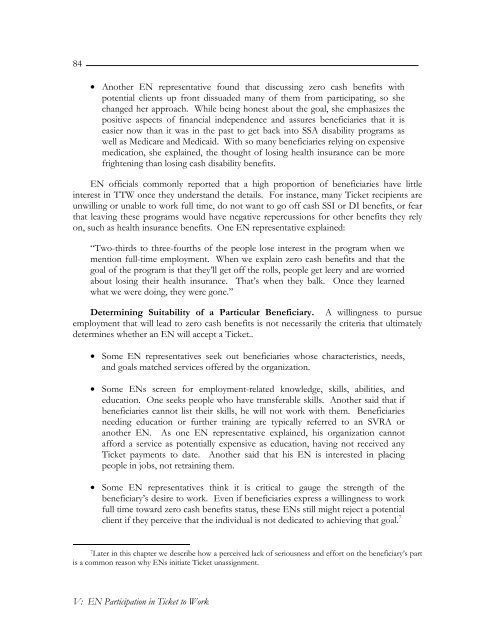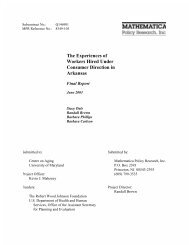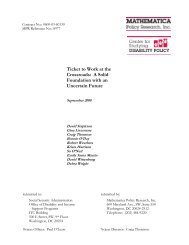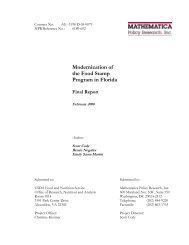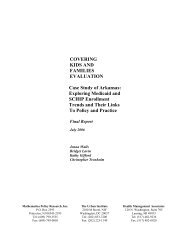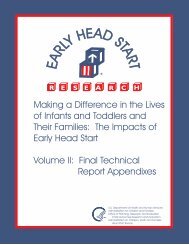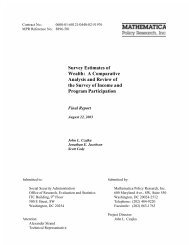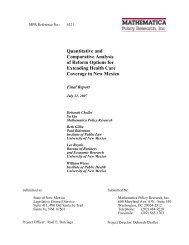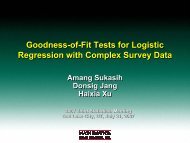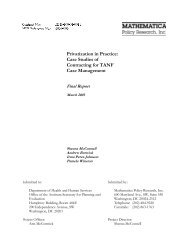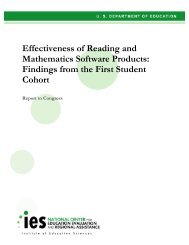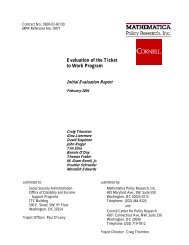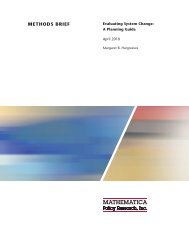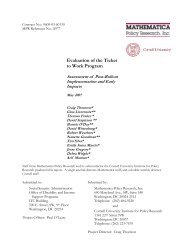Evaluation of the Ticket to Work Program, Implementation ...
Evaluation of the Ticket to Work Program, Implementation ...
Evaluation of the Ticket to Work Program, Implementation ...
You also want an ePaper? Increase the reach of your titles
YUMPU automatically turns print PDFs into web optimized ePapers that Google loves.
84• Ano<strong>the</strong>r EN representative found that discussing zero cash benefits withpotential clients up front dissuaded many <strong>of</strong> <strong>the</strong>m from participating, so shechanged her approach. While being honest about <strong>the</strong> goal, she emphasizes <strong>the</strong>positive aspects <strong>of</strong> financial independence and assures beneficiaries that it iseasier now than it was in <strong>the</strong> past <strong>to</strong> get back in<strong>to</strong> SSA disability programs aswell as Medicare and Medicaid. With so many beneficiaries relying on expensivemedication, she explained, <strong>the</strong> thought <strong>of</strong> losing health insurance can be morefrightening than losing cash disability benefits.EN <strong>of</strong>ficials commonly reported that a high proportion <strong>of</strong> beneficiaries have littleinterest in TTW once <strong>the</strong>y understand <strong>the</strong> details. For instance, many <strong>Ticket</strong> recipients areunwilling or unable <strong>to</strong> work full time, do not want <strong>to</strong> go <strong>of</strong>f cash SSI or DI benefits, or fearthat leaving <strong>the</strong>se programs would have negative repercussions for o<strong>the</strong>r benefits <strong>the</strong>y relyon, such as health insurance benefits. One EN representative explained:“Two-thirds <strong>to</strong> three-fourths <strong>of</strong> <strong>the</strong> people lose interest in <strong>the</strong> program when wemention full-time employment. When we explain zero cash benefits and that <strong>the</strong>goal <strong>of</strong> <strong>the</strong> program is that <strong>the</strong>y’ll get <strong>of</strong>f <strong>the</strong> rolls, people get leery and are worriedabout losing <strong>the</strong>ir health insurance. That’s when <strong>the</strong>y balk. Once <strong>the</strong>y learnedwhat we were doing, <strong>the</strong>y were gone.”Determining Suitability <strong>of</strong> a Particular Beneficiary. A willingness <strong>to</strong> pursueemployment that will lead <strong>to</strong> zero cash benefits is not necessarily <strong>the</strong> criteria that ultimatelydetermines whe<strong>the</strong>r an EN will accept a <strong>Ticket</strong>..• Some EN representatives seek out beneficiaries whose characteristics, needs,and goals matched services <strong>of</strong>fered by <strong>the</strong> organization.• Some ENs screen for employment-related knowledge, skills, abilities, andeducation. One seeks people who have transferable skills. Ano<strong>the</strong>r said that ifbeneficiaries cannot list <strong>the</strong>ir skills, he will not work with <strong>the</strong>m. Beneficiariesneeding education or fur<strong>the</strong>r training are typically referred <strong>to</strong> an SVRA orano<strong>the</strong>r EN. As one EN representative explained, his organization cannotafford a service as potentially expensive as education, having not received any<strong>Ticket</strong> payments <strong>to</strong> date. Ano<strong>the</strong>r said that his EN is interested in placingpeople in jobs, not retraining <strong>the</strong>m.• Some EN representatives think it is critical <strong>to</strong> gauge <strong>the</strong> strength <strong>of</strong> <strong>the</strong>beneficiary’s desire <strong>to</strong> work. Even if beneficiaries express a willingness <strong>to</strong> workfull time <strong>to</strong>ward zero cash benefits status, <strong>the</strong>se ENs still might reject a potentialclient if <strong>the</strong>y perceive that <strong>the</strong> individual is not dedicated <strong>to</strong> achieving that goal. 77 Later in this chapter we describe how a perceived lack <strong>of</strong> seriousness and effort on <strong>the</strong> beneficiary’s partis a common reason why ENs initiate <strong>Ticket</strong> unassignment.V: EN Participation in <strong>Ticket</strong> <strong>to</strong> <strong>Work</strong>


